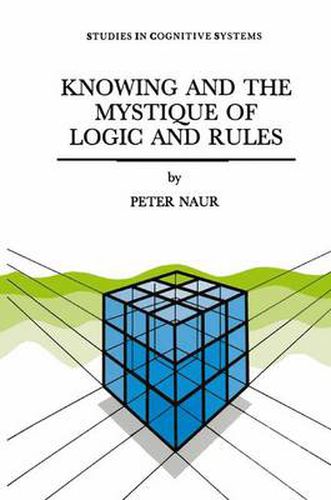Readings Newsletter
Become a Readings Member to make your shopping experience even easier.
Sign in or sign up for free!
You’re not far away from qualifying for FREE standard shipping within Australia
You’ve qualified for FREE standard shipping within Australia
The cart is loading…






This title is printed to order. This book may have been self-published. If so, we cannot guarantee the quality of the content. In the main most books will have gone through the editing process however some may not. We therefore suggest that you be aware of this before ordering this book. If in doubt check either the author or publisher’s details as we are unable to accept any returns unless they are faulty. Please contact us if you have any questions.
Human knowing is examined as it emerges from classical empirical psychology, with its ramifications into language, computing, science, and scholarship. While the discussion takes empirical support from a wide range, claims for the significance of logic and rules are challenged throughout. Highlights of the discussion:
knowing is a matter of habits or dispositions that guide the person’s stream of consciousness;
rules of language have no significance in language production and understanding, being descriptions of linguistic styles;
statements that may be true or false enter into ordinary linguistic activity, not as elements of messages, but merely as summaries of situations, with a view to action;
in computer programming the significance of logic, proof, and formalized description, is incidental and subject to the programmer’s personality;
analysis of computer modelling of the mental activity shows that in describing human knowing the computer is irrelevant;
in accounting for the scholarly/scientific activity, logic and rules are impotent;
a novel theory: scholarship and science have coherent descriptions as their core.
The discussion addresses questions that are basic to advanced applications of computers and to students of language and science.
$9.00 standard shipping within Australia
FREE standard shipping within Australia for orders over $100.00
Express & International shipping calculated at checkout
This title is printed to order. This book may have been self-published. If so, we cannot guarantee the quality of the content. In the main most books will have gone through the editing process however some may not. We therefore suggest that you be aware of this before ordering this book. If in doubt check either the author or publisher’s details as we are unable to accept any returns unless they are faulty. Please contact us if you have any questions.
Human knowing is examined as it emerges from classical empirical psychology, with its ramifications into language, computing, science, and scholarship. While the discussion takes empirical support from a wide range, claims for the significance of logic and rules are challenged throughout. Highlights of the discussion:
knowing is a matter of habits or dispositions that guide the person’s stream of consciousness;
rules of language have no significance in language production and understanding, being descriptions of linguistic styles;
statements that may be true or false enter into ordinary linguistic activity, not as elements of messages, but merely as summaries of situations, with a view to action;
in computer programming the significance of logic, proof, and formalized description, is incidental and subject to the programmer’s personality;
analysis of computer modelling of the mental activity shows that in describing human knowing the computer is irrelevant;
in accounting for the scholarly/scientific activity, logic and rules are impotent;
a novel theory: scholarship and science have coherent descriptions as their core.
The discussion addresses questions that are basic to advanced applications of computers and to students of language and science.